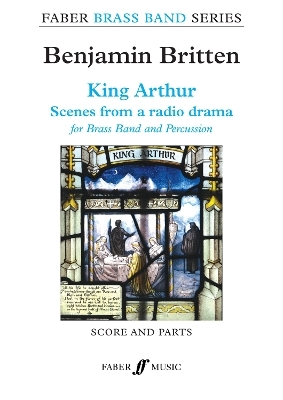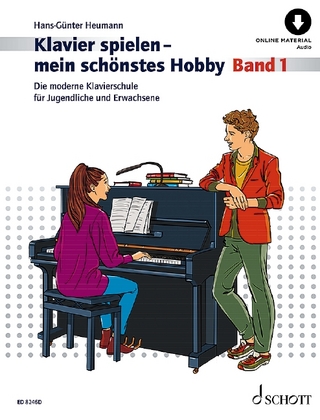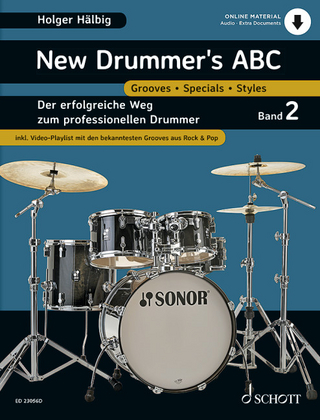
King Arthur (Brass Band Score and Parts)
Faber Music Ltd
978-0-571-57207-6 (ISBN)
This colourful suite incorporates the Introduction, a dramatic Wild Dance, some of the music underscoring the scenes for Galahad and The Holy Grail, and two vivid battle scenes, ending with The Final Battle and Apotheosis. King Arthur (scenes from a radio drama) for brass band should not be confused with a much longer orchestral suite which Paul Hindmarsh devised from the same source in 1995.
Several decades after his death, we have a more complete picture of Benjamin Britten as a composer than during his lifetime. Works from his youth and works that he suppressed have been played and published; the late music can now be seen as a distinct phase, in some ways as forward looking and as influential as Stravinsky's. Above all, Britten's central place in the history of 20th-century music seems more and more assured. He is one of very few composers born in the last century whose whole output - from operas to solo pieces - has gained a secure place in the repertoire. Britten was born into a middle-class family in Lowestoft, Suffolk, on 22 November 1913. His mother encouraged him to learn the piano and the viola, and to compose; by the age of fourteen he had written over 100 works. Little of this abundant juvenilia has so far been heard, but Britten himself selected Five Waltzes for piano, composed between 1923 and 1925, for publication in 1969: they are not simply charming but have the feel of genuine music. In 1927 he began studying composition with Frank Bridge, and immediately made huge strides. The Quatre Chansons Francaises (1928) show an extraordinary sophistication both in the choice of texts and in the handling of the orchestra. A few years later he was writing chamber works, such as the Quartettino (1930) for string quartet, whose up-to-date musical language rivals anything being written in Britain at the time. The young Britten was iconoclastic, often scornful of his older, less gifted contemporaries; his music was brilliant and unsentimental. He was the cleverest composer around, but also the most musical. Throughout the 1930's and 1940's Britten was tirelessly prolific; his opused works are far outnumbered by the vast quantity of incidental music of all kinds - for films, plays and especially BBC radio - that he produced with unflagging industry. His 1939 score for J.B.Priestley's play, Johnson Over Jordan (1939), is a good example of the type of music that he was able to compose in a few days, yet with undiminished care and skill. The `Spider and the Fly' (1939) movement shows his grasp of the popular musical idiom of the time, an interest that is fully evident in his first opera Paul Bunyan (1940), which sometimes uncannily anticipates Oklahoma! and contains some of the most envigorating music he ever wrote. Had he stayed in America, Britten might well have written Broadway hits as well as operas. As it was, his two years in America confirmed him as a tonal composer at a time when the idea of tonality was under threat - and had been questioned by Britten himself in some of his earlier music. The radiant diatonicism of Young Apollo (1939)- his first response to American light and space - symbolizes this fresh start. In 1964 Donald Mitchell instigated the foundation of Faber Music with the prime purpose of taking over the publication of Britten's music. Britten was intimately concerned with the company as a director until his death in 1976. One of the first Britten works to be published by Faber, Curlew River (1964), also marked a new departure for him. It presented a sparer, leaner style, with use of heterophony and greater rhythmic independence for the individual instruments, which was developed in two further Church Parables, The Burning Fiery Furnace and The Prodigal Son (1968), and spills over into almost all his late pieces. Britten's last twelve years also produced the opera Death in Venice (1973), which sums up the conflict of innocence and experience that obsessed him all his life; three cello suites for Rostropovich which are the finest since Bach; and a string quartet - no.3 - worthy to stand alongside Bartok. There is a special poignancy about the works of the final three years, composed after his unsuccessful heart operation: they bravely confront death, whether openly, as in Phaedra (1975), or secretly, as in the last movement of the Suite on English Folk Tunes (1974) - a small masterpiece which, even if nothing else of Britten's were to survive, would mark him as a great composer.
| Verlagsort | Harlow |
|---|---|
| Sprache | englisch |
| Maße | 210 x 297 mm |
| Themenwelt | Kunst / Musik / Theater ► Musik ► Instrumentenkunde |
| Kunst / Musik / Theater ► Musik ► Klassik / Oper / Musical | |
| ISBN-10 | 0-571-57207-3 / 0571572073 |
| ISBN-13 | 978-0-571-57207-6 / 9780571572076 |
| Zustand | Neuware |
| Haben Sie eine Frage zum Produkt? |
aus dem Bereich


